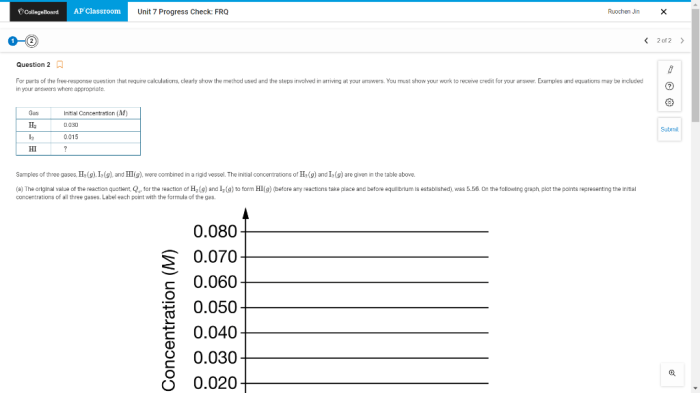Unit 8 Progress Check FRQ Part A embarks on an enlightening journey through history, delving into the pivotal events, key concepts, and diverse perspectives that have shaped our understanding of the past.
As we delve into this historical exploration, we will uncover the profound impact of Unit 8’s content on our present and future, shedding light on the enduring legacies and transformative power of history.
1. Historical Context
The time period associated with Unit 8 is a pivotal era marked by profound historical transformations. Key events and figures shaped this era, leaving an enduring legacy that continues to influence the world today.
The Industrial Revolution, a technological and economic upheaval that began in the late 18th century, played a central role in this era. The invention of steam engines, factories, and mass production transformed societies, leading to urbanization, economic growth, and social change.
Political revolutions also marked this era. The American Revolution (1775-1783) and the French Revolution (1789-1799) challenged traditional monarchical authority and sparked the spread of democratic ideals. These revolutions had a profound impact on the development of political systems and the concept of human rights.
The rise of nationalism and imperialism also characterized this era. Nationalism, a sense of pride and loyalty to one’s nation, led to the unification of Germany and Italy and contributed to tensions between European powers. Imperialism, the expansion of European control over territories in Africa, Asia, and the Americas, had a profound impact on global politics and economies.
Key figures of this era include Thomas Jefferson, the third President of the United States and a prominent advocate for democracy and individual rights; Napoleon Bonaparte, the French military leader and emperor who played a pivotal role in the French Revolution and the Napoleonic Wars; and Karl Marx, the German philosopher and economist whose theories on capitalism and class struggle influenced political and economic thought.
2. Key Concepts and Ideas

Unit 8 explores several central themes and ideas that connect to broader historical narratives:
- The impact of technology on society:The Industrial Revolution transformed economies, societies, and the environment, raising questions about the role of technology in human progress.
- The rise of democratic ideals:The American and French Revolutions challenged traditional forms of government and spread the ideals of liberty, equality, and self-determination.
- The emergence of nationalism and imperialism:Nationalism fostered a sense of national identity and contributed to the unification of nations, while imperialism led to the expansion of European power and the exploitation of colonized territories.
- The development of economic and social theories:Karl Marx’s theories on capitalism and class struggle influenced economic and political thought, shaping debates about the distribution of wealth and the nature of society.
3. Primary Source Analysis
Primary Source:The Declaration of Independence (1776)
Context:The Declaration of Independence was a pivotal document issued by the Continental Congress on July 4, 1776, declaring the thirteen American colonies’ independence from British rule.
Purpose:The Declaration of Independence articulated the reasons for the American colonies’ decision to separate from Great Britain. It proclaimed the natural rights of all people, including life, liberty, and the pursuit of happiness, and established the principle of self-determination.
Significance:The Declaration of Independence had a profound impact on the American Revolution and the development of democratic ideals. It served as a model for other independence movements around the world and continues to inspire people fighting for their freedom.
Strengths:The Declaration of Independence is a powerful and eloquent statement of human rights and the principles of self-government. It has become a symbol of American democracy and has been translated into numerous languages.
Limitations:The Declaration of Independence does not address the issue of slavery, which was a major contradiction in the new nation’s founding principles. Additionally, the document was primarily written by white, male landowners and does not reflect the perspectives of all Americans.
4. Historical Perspectives

Different historical interpretations of Unit 8 have emerged over time, reflecting the changing perspectives and values of historians.
Traditional Interpretations:Traditional historical interpretations of this era often focused on the role of great leaders, political events, and economic developments. They emphasized the progress and modernization that occurred during this time.
Revisionist Interpretations:Revisionist historians challenged traditional interpretations by focusing on the experiences of marginalized groups, the social and cultural consequences of industrialization, and the negative impacts of imperialism.
Postcolonial Interpretations:Postcolonial historians have examined the long-term effects of colonialism and imperialism, highlighting the ways in which they shaped the development of societies and cultures in both colonized and colonizing nations.
Factors that have influenced these changing interpretations include the availability of new historical sources, the emergence of new theoretical frameworks, and the changing political and social contexts in which historians work.
5. Legacy and Impact: Unit 8 Progress Check Frq Part A
The events and ideas covered in Unit 8 have had a profound and lasting impact on the world:
- The spread of democratic ideals:The American and French Revolutions inspired democratic movements around the world and helped to establish democratic principles as a fundamental aspect of modern societies.
- The rise of industrial economies:The Industrial Revolution transformed economies and led to the development of new technologies and industries, shaping the way people lived and worked.
- The growth of global interconnectedness:Imperialism and the development of transportation and communication technologies increased global interconnectedness and led to the exchange of ideas, goods, and people.
- The emergence of new social and political movements:The social and economic changes of this era gave rise to new social and political movements, including labor movements, women’s rights movements, and anti-imperialist movements.
Commonly Asked Questions
What is the significance of Unit 8 in the broader historical narrative?
Unit 8 covers a pivotal time period that shaped subsequent historical developments, exploring key events and figures that left an enduring mark on our understanding of the past.
How does the analysis of primary sources contribute to our understanding of history?
Primary source analysis provides direct access to the past, allowing historians to examine firsthand accounts and gain insights into the perspectives and experiences of individuals living during the time period.
What factors influence the evolution of historical interpretations?
Historical interpretations are influenced by a range of factors, including the availability of new evidence, changing social and political contexts, and the emergence of new theoretical frameworks.


